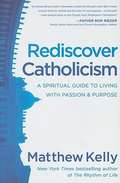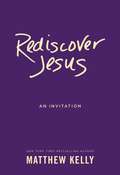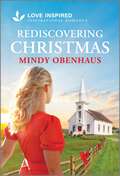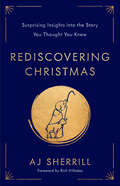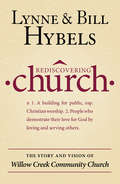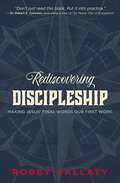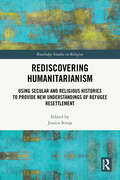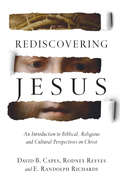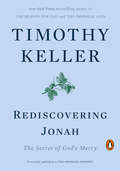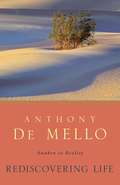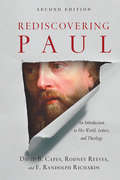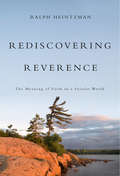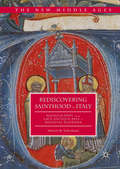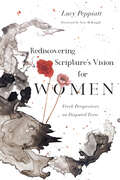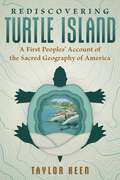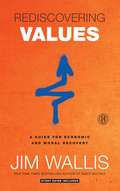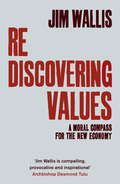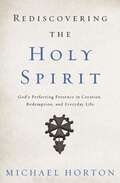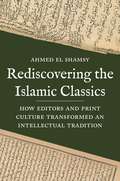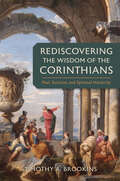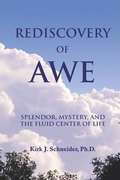- Table View
- List View
Rediscover Catholicism: A Spiritual Guide to Living with Passion and Purpose
by Matthew KellyAt a Time When Many Catholics are Disillusioned, Questioning Their Faith, and Filled with Doubts About the Relevance of Catholicism in the Modern World, the Voice of One Man Cries Out to the World's Largest Faith Community With a Clarity That is Rare and Inspiring. The book will also be helpful to persons of any Christian faith who are interested in returning to their religious roots.
Rediscover Jesus: An Invitation
by Matthew KellyAt a time when so many people are spiritually disillusioned and searching for ways to live, love, work, and play that nurture the soul rather than destroy it, Matthew Kelly once again delivers a powerful book that encourages us in our weariness, challenges us in our comfort, and invites us to rediscover the beautiful possibilities God places before us daily. <P><P> Rediscover Jesus is a profound invitation to seek deeply personal answers to our deeply personal questions. Each page seems to effortlessly reach into every aspect our lives, providing spiritual wisdom and practical insights that help us to know both Jesus and ourselves in a new way. Some books find us at just the right time, and those books change our lives forever. Rediscover Jesus is one of those books.
Rediscover Jesus: An Invitation
by Matthew KellyAT A TIME WHEN SO MANY PEOPLE are spiritually disillusioned and searching for ways to live, love, work, and play that nurture the soul rather than destroy it, Matthew Kelly, once again, delivers a powerful book that encourages us in our weariness, challenges us in our comfort, and invites us to rediscover the beautiful possibilities God places before us daily. Rediscover Jesus is a profound invitation to seek deeply personal answers to our deeply personal questions. Each page seems to effortlessly reach deep into our lives, providing spiritual wisdom and practical insights that help us get to know both Jesus and ourselves in a new way. Some books find us at just the right time, and those books change our lives forever. Rediscover Jesus is one of those books. This book may be used any time or as a meditation for Lent with its 40 short chapters (about 4 pages long) each followed by a Point to Ponder, question to consider, a Bible Verse to Live and a Prayer, all practical, very brief and inspiring.
Rediscovering Christmas: An Uplifting Inspirational Romance (Hope Crossing #6)
by Mindy ObenhausShe feels she&’s lost everything… Will love give her hope? When a wildfire destroys her home, widowed schoolteacher Tori Stallings finds herself unexpectedly living with her mother- and brother-in-law—and struggling with her faith. With everything Tori owns consumed by the blaze, Micah vows to help his late brother&’s wife and son rebuild their lives. The two of them have always been friends, but living under the same roof has their friendship turning into something more. Can love bloom amid tragic loss and shaken beliefs, and give them a fresh start for Christmas?From Love Inspired: Uplifting stories of faith, forgiveness and hope.Hope Crossing Book 1: The Cowgirl's RedemptionBook 2: A Christmas BargainBook 3: Loving the Rancher's ChildrenBook 4: Hidden Secrets Between ThemBook 5: Rediscovering Christmas
Rediscovering Christmas: Surprising Insights into the Story You Thought You Knew
by AJ SherrillA profound exploration of the Bible&’s Christmas story that delivers surprising insights to embrace the ancient wonder of the holiday season. &“If you want this Christmas to be the best ever, read this book. Rediscovering Christmas opened my eyes to a world of meaning I had never known.&”—Steven Pressfield, bestselling author of Gates of Fire and The War of ArtAre you tired of feeling exhausted, overwhelmed, and empty during the holiday season? Instead of getting caught up in the hustle and bustle, are you ready to slow down, catch your breath, and rediscover the true beauty of Christmas?This captivating collection of readings explores the intersection where the ancient context meets the present moment. Pastor AJ Sherrill invites you into an experience designed to renew your mind, reawaken your heart, rekindle your awe, and restore your body. Rediscovering Christmas is divided into two sections: Advent, which teaches the purpose of waiting, and Christmas, which reveals the joy of receiving. Through meaningful reflections, practices, and illustrations, you&’ll see the diverse characters of the first Christmas in a new light—and comprehend just how their stories intertwine with your own.Return to its pages year after year, and let it refresh your heart and mind about the wonder of Christmas. Rediscovering Christmas is a timeless companion that will become a cherished tradition in your holiday season.
Rediscovering Church: The Story and Vision of Willow Creek Community Church
by Bill Hybels Lynne HybelsRediscovering Church is the candid story of Willow Creek Community Church’s phenomenal growth, from 100 members meeting in a Palatine, Illinois, movie theater to its present Sunday morning attendance of 15,000. Bill Hybels and his wife, Lynne, tell about Willow Creek’s beginnings, its struggles, the philosophy behind its success, and the strategies that have made it a model for church growth. The first half of the book, written by Lynne Hybels, explores the early years of Willow Creek and the personal accounts behind one of this century's most remarkable church stories. It offers an honest look at the ways God has used both the strengths and weaknesses of His people, creating a church of believers who have had tremendous impact for Christ in their community. In the second half of Rediscovering Church, Bill Hybels helps you apply the strengths of Willow Creek's ministry philosophy to your own congregation's mission. From mission statements to developing leadership, making sound financial decisions, and handling growth, Bill stresses that God wants to build His church to be an effective and committed community of faith that reaches out to a hurting world, to be the body of Christ in real and tangible ways. Rediscovering Church draws on the experiences of Willow Creek to show how one fellowship crystallized its mission and methodology, its vision and values. The Willow Creek story provides an example that churches and individuals alike can turn to for inspiration, encouragement, and a means of uncovering the pattern for their own unique mission and ministry.
Rediscovering Discipleship: Making Jesus’ Final Words Our First Work
by Ed Stetzer Robby GallatyDiscipleship is the buzzword today. Many believers are contemplating in a fresh way what it means to take the Great Commission seriously. Rediscovering Discipleship takes the guesswork out of Christian maturity. Based on insights gained from a decade of personally making disciples, author and pastor Robby Gallaty tackles the two hindrances that keep believers from getting involved in making disciples: ignorance and uncertainty. Since many believers have never been personally disciple, they have no model to guide them in discipling others. Their ignorance of the process fuels their uncertainty, which leaves them crippled from the start. With simple principles that are easy to apply, Rediscovering Discipleship provides readers with the tools to follow the Great Commission—to go and actually make disciples who multiply and make disciples.Gallaty begins with a brief historical overview of the discipleship ministries of influential theologians, preachers, and pastors from years past, and then identifies roadblocks that hinder believers from becoming disciples before offering a step-by-step process for readers to immediately get started on the path to effective disciple making.
Rediscovering Humanitarianism: Using Secular and Religious Histories to Provide New Understandings of Refugee Resettlement (Routledge Studies in Religion)
by Jessica StrojaThis book provides a new approach to understanding the histories of refugee resettlement and their relevance for contemporary emergencies. By drawing on histories of faith-based humanitarianism from 1917 to the present, it explores how faith-based organisations have engaged with refugee aid and the efforts of other secular humanitarian movements.These understandings of humanitarianism and refugee resettlement are developed through the lens of faith-based histories and intersections with secular humanitarian movements. The book uses these histories to understand trends in humanitarian development and interactions between multiple organisations that have held ongoing roles in refugee emergencies. Exploring interactions between these organisations provides new ways of understanding humanitarianism and trends in the delivery of refugee aid. As the number of refugees requiring assistance continues to increase globally, understanding trends in this historical development has never been more important.This gives new ways to understand the provision of refugee aid via a broad spectrum of organisations rather than groups from separate “categories” acting in isolation. Despite the frequent marginalisation of faith-based organisations, the book shows they have reframed humanitarian efforts. This provides researchers, policy makers and practitioners with new ways to approach this challenge and the historical development of refugee aid.
Rediscovering Jesus: An Introduction to Biblical, Religious and Cultural Perspectives on Christ
by Rodney Reeves E. Randolph Richards David B. Capes2015 Readers' Choice Awards Honorable MentionNijay Gupta's Best Academic NT Books of 2015, Honorable Mention, Best Textbook
Rediscovering Jonah: The Secret of God's Mercy
by Timothy KellerPastor and New York Times bestselling author Timothy Keller reveals the hidden depths within the book of Jonah—the most misunderstood parable in the Bible.The story of Jonah is one of the most well-known parables in the Bible. It is also the most misunderstood. Many people, even those who are nonreligious, are familiar with Jonah: A rebellious prophet who defies God and is swallowed by a whale. But there's much more to Jonah's story than most of us realize.In Rediscovering Jonah, pastor and New York Times bestselling author Timothy Keller reveals the hidden depths within the book of Jonah. Keller makes the case that Jonah was one of the worst prophets in the entire Bible. And yet there are unmistakably clear connections between Jonah, the prodigal son, and Jesus. Jesus in fact saw himself in Jonah. How could one of the most defiant and disobedient prophets in the Bible be compared to Jesus?Jonah's journey also doesn't end when he is freed from the belly of the fish. There is an entire second half to his story--but it is left unresolved within the text of the Bible. Why does the book of Jonah end on what is essentially a cliffhanger? In these pages, Timothy Keller provides an answer to the extraordinary conclusion of this biblical parable--and shares the powerful Christian message at the heart of Jonah's story.
Rediscovering Life: Awaken to Reality
by Anthony De MelloA companion to Anthony De Mello's all-time bestselling work of inspiration, Awareness.Anthony De Mello was one of the most important spiritual writers of the 20th century. Since his death in 1987, his stature has only increased. His books, including Song of the Bird, Sadhana, and the international bestselling Awareness are considered by many to be some of the most influential spiritual teachings of the last 50 years. Now, to commemorate the 25th anniversary of his passing, Image Books is proud to present what may very well prove to be the last published work of this beloved spiritual teacher. Based on a lecture given just months before his death, Rediscovering Life invites us to unlock the deeper meaning of our lives. By becoming aware of the circuitous and habitual nature of our limiting thoughts, we can find simple solutions that will release us from feelings of isolation, anger, sadness and depression. In short, De Mello offers us a new way to look at the world and God that will transform our lives. Rediscovering Life is a timeless and compassionate book that will awaken you to the beauty of human experience and increase your ability to see God in all things.
Rediscovering Paul: An Introduction to His World, Letters, and Theology
by Rodney Reeves E. Randolph Richards David B. CapesFor some of us, the apostle Paul is intimidating, like a distant and difficult uncle. Maybe not someone you'd like to hang out with at a coffee shop on a rainy day. He'd make a scene, evangelize the barista, and arouse looks across the room. For a mid-morning latte, we'd prefer Jesus over Paul. But Paul is actually the guy who—from Ephesus to Athens—was the talk of the marketplace, the raconteur of the Parthenon. He knew everyone, founded emerging churches, loved the difficult people, and held his own against the intellectuals of his day. If you’re willing to give Paul a try, Rediscovering Paul is your reliable guide. This is a book that reacquaints us with Paul, as if for the first time. Drawing on the best of contemporary scholarship, and with language shaped by teaching and conversing with today's students, Rediscovering Paul is a textbook that has passed the test. Now in a reworked edition, it's better than ever. There are fresh discussions of Paul’s letter writing and how those letters were received in the churches, new considerations of pseudonymity and the authenticity of Paul’s letters, and updated coverage of recent developments in interpreting Paul. from Paul’s conversion and call to his ongoing impact on church and culture, this second edition of Rediscovering Paul comes enthusiastically recommended.
Rediscovering Reverence
by Ralph HeintzmanDrawing on familiar experiences as well as aspects of western and eastern spiritual traditions, Heintzman argues that religious practice is rooted in two basic ways human beings act in the world. It is therefore an element in the structure of the human spirit, not a phase in its history. Explaining the meaning of religious practice in contemporary language, Rediscovering Reverence is addressed to anyone who wants to explore the meaning and promise of a religious life. A unique and thoughtful meditation on the role of reverence in everyday life, Rediscovering Reverence presents new perspectives on modern faith, religion, and both personal and societal well-being.
Rediscovering Reverence: The Meaning of Faith in a Secular World
by Ralph HeintzmanDrawing on familiar experiences as well as aspects of western and eastern spiritual traditions, Heintzman argues that religious practice is rooted in two basic ways human beings act in the world. It is therefore an element in the structure of the human spirit, not a phase in its history. Explaining the meaning of religious practice in contemporary language, Rediscovering Reverence is addressed to anyone who wants to explore the meaning and promise of a religious life. A unique and thoughtful meditation on the role of reverence in everyday life, Rediscovering Reverence presents new perspectives on modern faith, religion, and both personal and societal well-being.
Rediscovering Sainthood in Italy
by Edward M. SchoolmanBeginning with Saint Barbatianus, a fifth-century wonderworking monk and confessor to the Empress Galla Placidia, this book focuses on the changes in the religious landscape of Ravenna, a former capital of the Late Roman Empire, through the Middle Ages. During this period, written stories about saints and their relics not only offered guidance and solace but were also used by those living among the ruins of a once great city--particularly its archbishops, monks, and the urban aristocracy--to reflect on its past glory. This practice remained important to the citizens of Ravenna as they came to terms with the city's revival and renewed relevance in the tenth century under Ottonian rule. In using the vita of Barbatianus as a central text, Edward M. Schoolman explores how saints and sanctity were created and ultimately came to influence complex political and social networks, from the Late Roman Empire to the High Middle Ages.
Rediscovering Scripture's Vision for Women: Fresh Perspectives on Disputed Texts
by Lucy PeppiattDoes God call women to serve as equal partners in marriage and as leaders in the church? The answer to this straightforward question is deeply contested. Into the fray, Lucy Peppiatt offers her work on interpretation of the Bible and Christian practice. With careful exegetical work, Peppiatt considers relevant passages in Ephesians, Colossians, 1 Peter, 1 Timothy, and 1 Corinthians. There she finds a story of God releasing women alongside men into all forms of ministry, leadership, work, and service on the basis of character and gifting, rather than biological sex. Those who see the overturning of male-dominated hierarchy in the Scriptures, she argues, are truly rediscovering an ancient message—a message distorted by those who assumed that a patriarchal world, which they sometimes saw reflected in the Bible, was the one God had ordained.
Rediscovering Turtle Island: A First Peoples' Account of the Sacred Geography of America
by Taylor Keen• Examines the complexities of Indigenous legends and creation myths and reveals common oral traditions across much of North America• Explores the history of Cahokia, the Mississippian Mound Builder Empire of 1050-1300 CE, told through the voice of Honga, a Native leader of the time• Presents an Indigenous revisionist history regarding Thomas Jefferson, expansionist doctrine, and Manifest DestinyWhile Western accounts of North American history traditionally start with European colonization, Indigenous histories of North America—or Turtle Island—stretch back millennia. Drawing on comparative analysis, firsthand Indigenous accounts, extensive historical writings, and his own experience, Omaha Tribal member, Cherokee citizen, and teacher Taylor Keen presents a comprehensive re-imagining of the ancient and more recent history of this continent&’s oldest cultures. Keen reveals shared oral traditions across much of North America, including among the Algonquin, Athabascan, Sioux, Omaha, Ponca, Osage, Quapaw, and Kaw tribes. He explores the history of Cahokia, the Mississippian Mound Builder Empire of 1050–1300 CE. And he examines ancient earthen works and ceremonial sites of Turtle Island, revealing the Indigenous cosmology, sacred mathematics, and archaeoastronomy encoded in these places that artfully blend the movements of the sun, moon, and stars into the physical landscape.Challenging the mainstream historical consensus, Keen presents an Indigenous revisionist history regarding Thomas Jefferson, expansionist doctrine, and Manifest Destiny. He reveals how, despite being displaced as the United States colonized westward, the Native peoples maintained their vision of an intrinsically shared humanity and the environmental responsibility found at the core of Indigenous mythology.Building off a deep personal connection to the history and mythology of the First Peoples of the Americas, Taylor Keen gives renewed voice to the cultures of Turtle Island, revealing an alternative vision of the significance of our past and future presence here.
Rediscovering Values
by Jim WallisWhen we start with the wrong question, no matter how good an answer we get, it won't give us the results we want. Rather than joining the throngs who are asking, When will this economic crisis be over? Jim Wallis says the right question to ask is How will this crisis change us? The worst thing we can do now, Wallis tells us, is to go back to normal. Normal is what got us into this situation. We need a new normal, and this economic crisis is an invitation to discover what that means. Some of the principles Wallis unpacks for our new normal are . . .* Spending money we don't have for things we don't need is a bad foundation for an economy or a family.* It's time to stop keeping up with the Joneses and start making sure the Joneses are okay.* The values of commercials and billboards are not the things we want to teach our children.* Care for the poor is not just a moral duty but is critical for the common good.* A healthy society is a balanced society in which markets, the government, and our communities all play a role.* The operating principle of God's economy says that there is enough if we share it.* And much, much more . . .In the pages of this book, Wallis provides us with a moral compass for this new economy--one that will guide us on Wall Street, Main Street, and Your Street.Embracing a New Economy Getting back to "the way things were" is not an option. It is time we take our economic uncertainty and use it to find some moral clarity. Too often we have been ruled by the maxims that greed is good, it's all about me, and I want it now. Those can be challenged only with some of our oldest and best values--enough is enough, we are in it together, and thinking not just for tomorrow but for future generations. Jim Wallis shows that the solution to our problems will be found only as individuals, families, friends, churches, mosques, synagogues, and entire communities wrestle with the question of values together.
Rediscovering Values
by Jim WallisWhen we start with the wrong question, no matter how good an answer we get, it won't give us the results we want. Rather than joining the throngs who are asking, When will this economic crisis be over? Jim Wallis says the right question to ask is How will this crisis change us? The worst thing we can do now, Wallis tells us, is to go back to normal. Normal is what got us into this situation. We need a new normal, and this economic crisis is an invitation to discover what that means. Some of the principles Wallis unpacks for our new normal are . . .* Spending money we don't have for things we don't need is a bad foundation for an economy or a family.* It's time to stop keeping up with the Joneses and start making sure the Joneses are okay.* The values of commercials and billboards are not the things we want to teach our children.* Care for the poor is not just a moral duty but is critical for the common good.* A healthy society is a balanced society in which markets, the government, and our communities all play a role.* The operating principle of God's economy says that there is enough if we share it.* And much, much more . . .In the pages of this book, Wallis provides us with a moral compass for this new economy--one that will guide us on Wall Street, Main Street, and Your Street.Embracing a New Economy Getting back to "the way things were" is not an option. It is time we take our economic uncertainty and use it to find some moral clarity. Too often we have been ruled by the maxims that greed is good, it's all about me, and I want it now. Those can be challenged only with some of our oldest and best values--enough is enough, we are in it together, and thinking not just for tomorrow but for future generations. Jim Wallis shows that the solution to our problems will be found only as individuals, families, friends, churches, mosques, synagogues, and entire communities wrestle with the question of values together.
Rediscovering Values: A Moral Compass For the New Economy
by Jim WallisWhen we start with the wrong question, no matter how good an answer we get, it won't give us the result we want. Rather than asking, 'When will this economic crisis be over?' Jim Wallis says the right question to ask is 'How will this crisis change us?'. The worst thing we can do now, Wallis tells us, is to go back to normal. Normal is what got us into this situation. We need a new normal, and now, in the midst of a crisis affecting every part of society, is the time to discover it. These are some of the principles Wallis suggests we should consider-Spending money we don't have on things we don't need is a bad foundation for an economy or a family-It's time to stop keeping up with the Joneses and start making sure the Joneses are okay-The values of adverts and billboards are not the things we want to teach our children-Caring for the poor is not just a moral duty but is critical for the common good-A healthy society is a balanced society in which markets, the government, and our communities all play a role-The operating principle of God's economy says that there is enough if we share itIn REDISCOVERING VALUES, Wallis equips us with a new moral compass for the future -- one that draws on some of our oldest and best values and one that will guide us in the City, our towns and our neighbourhoods.
Rediscovering the Holy Spirit: God’s Perfecting Presence in Creation, Redemption, and Everyday Life
by Michael HortonFor the Spirit, being somewhat forgotten is an occupational hazard. The Holy Spirit is so actively involved in our lives that we can take his presence for granted. As they say, familiarity breeds contempt. Just as we take breathing for granted, we can take the Holy Spirit for granted simply because we constantly depend on him. Like the cane that soon feels like an extension of the blind man&’s own body, we too easily begin to think of the Holy Spirit as an extension of ourselves.Yet the Spirit is at the center of the action in the divine drama from Genesis 1:2 all the way to Revelation 22:17. The Spirit&’s work is as essential as the Father&’s and the Son&’s, yet the Spirit&’s work is always directed to the person and work of Christ. In fact, the efficacy of the Holy Spirit&’s mission is measured by the extent to which we are focused on Christ. The Holy Spirit is the person of the Trinity who brings the work of the Father, in the Son, to completion. In everything that the Triune God performs, this perfecting work is characteristic of the Spirit.In Rediscovering the Holy Spirit, author, pastor, and theologian Mike Horton introduces readers to the neglected person of the Holy Spirit, showing that the work of God&’s Spirit is far more ordinary and common than we realize. Horton argues that we need to take a step back every now and again to focus on the Spirit himself—his person and work—in order to recognize him as someone other than Jesus or ourselves, much less something in creation. Through this contemplation we can gain a fresh dependence on the Holy Spirit in every area of our lives.
Rediscovering the Islamic Classics: How Editors and Print Culture Transformed an Intellectual Tradition
by Ahmed El ShamsyThe story of how Arab editors of the late nineteenth and early twentieth centuries revolutionized Islamic literatureIslamic book culture dates back to late antiquity, when Muslim scholars began to write down their doctrines on parchment, papyrus, and paper and then to compose increasingly elaborate analyses of, and commentaries on, these ideas. Movable type was adopted in the Middle East only in the early nineteenth century, and it wasn't until the second half of the century that the first works of classical Islamic religious scholarship were printed there. But from that moment on, Ahmed El Shamsy reveals, the technology of print transformed Islamic scholarship and Arabic literature.In the first wide-ranging account of the effects of print and the publishing industry on Islamic scholarship, El Shamsy tells the fascinating story of how a small group of editors and intellectuals brought forgotten works of Islamic literature into print and defined what became the classical canon of Islamic thought. Through the lens of the literary culture of nineteenth- and twentieth-century Arab cities—especially Cairo, a hot spot of the nascent publishing business—he explores the contributions of these individuals, who included some of the most important thinkers of the time. Through their efforts to find and publish classical literature, El Shamsy shows, many nearly lost works were recovered, disseminated, and harnessed for agendas of linguistic, ethical, and religious reform.Bringing to light the agents and events of the Islamic print revolution, Rediscovering the Islamic Classics is an absorbing examination of the central role printing and its advocates played in the intellectual history of the modern Arab world.
Rediscovering the Wisdom of the Corinthians: Paul, Stoicism, and Spiritual Hierarchy
by Timothy A. BrookinsA bold new reading of 1 Corinthians in light of Greco-Roman philosophy The First Letter to the Corinthians begins with an admonishment of the church over their internal division and reliance on human wisdom. What exactly occasioned Paul&’s advice has perennially troubled New Testament scholars. Many scholars have asserted that Paul disapproved of the Corinthians&’ infatuation with rhetoric. Yet careful exegesis of the epistle problematizes this consensus. Timothy A. Brookins unsettles common assumptions about the Corinthian conflict in this innovative monograph. His close reading of 1 Corinthians 1–4 presents evidence that the Corinthian problem had roots in Stoicism. The wisdom Paul alludes to is not sophistry, but a Stoic-inspired understanding of natural hierarchy, in which the wise put themselves above believers they considered spiritually underdeveloped. Moreover, Paul&’s followers saw themselves as a philosophical school in rivalry with other Christians, engendering divisions in the church. Combining scriptural exegesis and investigation of Greco-Roman philosophical culture, Brookins reconstructs the social sphere of Corinth that Paul addresses in his letter. His masterful analysis provides much needed clarity on the context of a major epistle and on Pauline theology more broadly.
Rediscovery Of Awe: Splendor, Mystery And The Fluid Center Of Life
by Kirk SchneiderRediscovery of Awe offers a potential bridge between two ostensible adversaries today: science and religion (also conceived as relativism vs. absolutism, atheism vs. theism, and postmodernity vs. fundamentalism). At its core, Rediscovery of Awe is a practical, psychological translation of an emerging spiritual transformation—a humanistic spirituality. It presents a provocative, and revolutionary, vision. The aim of the book is to revive a sense of awe—the humility and wonder, thrill and anxiety, splendor and mystery of living—in self, society, and spirit. It is an attempt to revive the capacity to be moved. Rediscovery of Awe promotes a new relation to life, and illustrates this relation over a broad range: from child-raising to education to the workplace, and from religion to politics and ethics. Set against our awe-deprived times, in which we tend to favor either a high tech, consumerist mentality or, contrastingly, a dogmatic, fundamentalist orientation, it presents a dynamic and rejuvenating alternative.
Redo Your Room
by Editors of Faithgirlz! Girls' Life MagWhether you’re looking for an all-out room redo or a few new tricks to brighten up your space, Faithgirlz! has tons easy how-tos and quick DIYs that'll morph your room into a true expression of y-o-u. Give your walls a burst of color (even without a bucket of paint!) and turn your fave pics and keepsakes into inspiring art. These floor-to-ceiling secrets help nix those piles of clothes decorating your space in favor of awesome add-ons, like mini murals and a magical ribbon chandelier (psst: we won't tell anyone it took you a half hour to whip up).Redo Your Room is packed with cute and crafty ways to add pop to your domain. You'll learn how to make even the tiniest spaces into pretty places to sleep 'n' study, and clever ways to keep it all looking adorable. And the best part? You can make over your bedroom without going broke.
